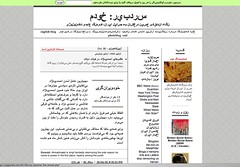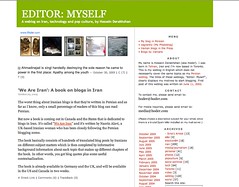"Into the blogosphere"
"we are producing this peer-reviewed edited collection about blogging in the spirit of blogging but with a focus on scholarly work that has been through the peer review process".
One of the postings (?) articles (?) articles from Frank Schaap about blogs in the Dutch Blogosphere. This is the beginning of it (the italics are mine):
"I must confess that much of the vibrant Dutch weblog community remained hidden from me for quite a while, even though I am Dutch, have my own weblog, and frequently use the Internet. I was aware of some of the more high profile Dutch weblogs, but as an early adopter and Internet researcher, my attention was mostly trained on the English-speaking part of the Internet. Few native English weblogs link to non-English weblogs in their blogroll and those English language weblogs that do link to non-English weblogs are usually written by non-native English speakers.1 Conversely, Dutch weblogs almost exclusively link to other Dutch weblogs in their blogroll, which only occasionally includes English language weblogs. In their entries, Dutch weblogs do link to English language web sites and copy or translate their news but the links of affiliation remain overwhelmingly with other Dutch weblogs. The Internet may be transnational but many communities remain bound by barriers of language.
"During the past three to four years, the Dutch weblog community has developed a distinct style of online presence. A number of terms and neologisms, that go beyond the technical terminology associated with weblogging, have developed and are now in use in the community, occasionally even seeping into mainstream media reporting on the Internet. Several sites track new posts to Dutch weblogs, there is a monthly e-zine, About:blank, "by bloggers for bloggers," that hosts the annual Dutch Bloggies award shows, and there are at least two Dutch-developed weblog systems available. The Dutch weblog community draws on international developments on the web and in the blogosphere, but articulates them according to the specifics of the Dutch context, showing the process of "glocalization" at work (Robertson, 1995)."







